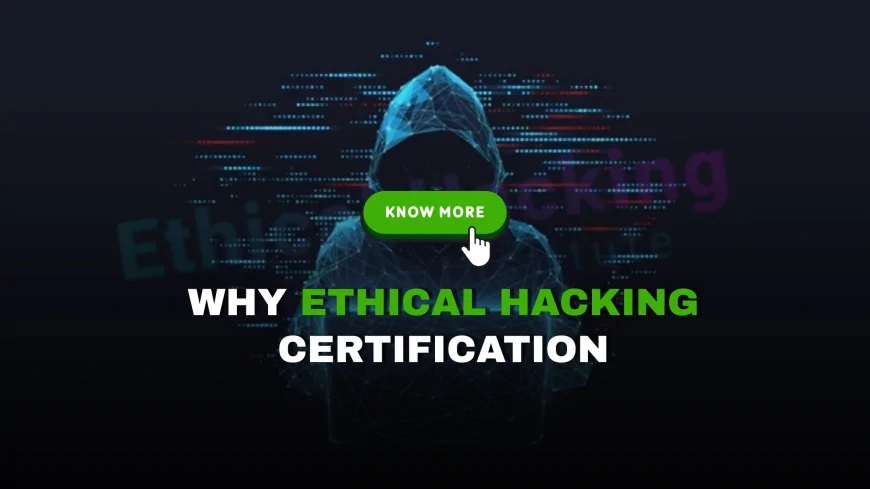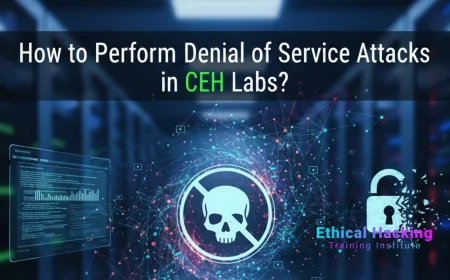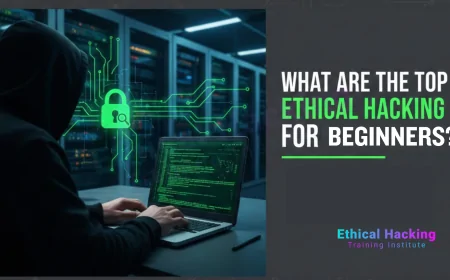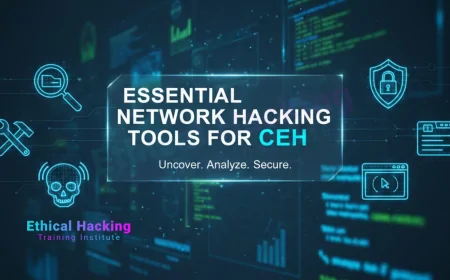Cyber Security Ethical Hacking Certification: How to Get Certified and What It Brings | Why Get Certified in Ethical Hacking? Career Benefits and Certification Steps
Learn how to get certified in ethical hacking and explore the career benefits, skills, and top cybersecurity certifications in 2025

Table of Contents
- Introduction
- Why Ethical Hacking Certification Matters
- Top Ethical Hacking Certifications 2025
- How to Get Certified: Steps & Training
- Essential Skills You’ll Gain
- Tools and Labs Used
- Cost & Time Investment
- Career Benefits & Salary Gains
- Advancing with Certification
- Best Practices to Prepare
- FAQs
- Conclusion
Introduction
In the evolving landscape of cyber threats, ethical hacking remains a cornerstone of defense. Certification in ethical hacking validates both your technical knowledge and practical auto skills. It signals to employers that you can identify vulnerabilities, mitigate threats, and secure digital assets. Whether you're a beginner or an IT professional, earning a recognized certification can accelerate your cybersecurity career.
Why Ethical Hacking Certification Matters
- Industry credibility: Recognized qualifications such as CEH, OSCP, and PenTest+ are trusted and respected globally.
- Learning structure: Certification tracks offer a systematic approach—covering theory, labs, reporting, and recognition.
- Competitive advantages: Certified professionals often earn 20–40% more and receive faster promotion.
- Hands-on competence: Certification processes include real-world simulations and labs, not just multiple-choice exams.
Top Ethical Hacking Certifications 2025
1. CEH – Certified Ethical Hacker (EC‑Council)
CEH teaches a broad range of pentesting techniques and includes optional practical exams. CEH v13 features modules on AI threats, cloud, IoT, and alignment with MITRE ATT&CK.
2. OSCP – Offensive Security Certified Professional
Known for its rigorous hands-on lab and 24-hour exam, OSCP remains a prestigious credential in the penetration testing community.
3. CompTIA PenTest+
A vendor-neutral intermediate-level certification focusing on scanning, vulnerability assessment, and reporting—with performance-based tasks.
4. eLearnSecurity eWPT & eMAPT
These certifications target web application and mobile app penetration testing, offering in-depth labs and proctored assessments.
5. OSCE – Offensive Security Certified Expert
An advanced credential focusing on exploit development and sophisticated attack techniques, intended for senior practitioners.
How to Get Certified: Steps & Training
- Select a certification aligned with your experience and career goals.
- Join structured training—official courses or self-paced platforms like TryHackMe, Hack The Box, or provider-specific labs.
- Build a home lab using Kali Linux and VirtualBox, or use cloud-based environments.
- Study formally—using official guides, video tutorials, and community resources.
- Practice extensively—focus on CTF challenges, real scenarios, and reporting.
- Take mock exams and prepare documentation—especially critical for OSCP-like certifications.
- Schedule and take the exam, optionally followed by practical assignments.
Essential Skills You’ll Gain
- Network scanning, enumeration, and reconnaissance
- Exploitation techniques—Metasploit, custom scripts, buffer overflows
- Web app attacks—SQLi, XSS, CSRF, SSRF
- Wireless network assessment and mobile app auditing
- Cloud and container security exploration
- Report generation and remediation guidance
Tools and Labs Used
- Kali Linux, Parrot OS
- Nmap, Wireshark, Burp Suite, Metasploit
- Web attack APIs, mobile tools like MobSF & Frida
- Lab platforms: TryHackMe, Hack The Box, Offensive Security Proving Grounds
Cost & Time Investment
| Certification | Trainer Cost | Exam Fee | Total & Duration |
|---|---|---|---|
| CEH | ₹50–80 k | ₹21 k | ₹70–100 k · 2–3 months |
| OSCP | ₹60–120 k | ₹50 k | ₹110–170 k · 4–6 months |
| PenTest+ | ₹20–30 k | ₹18 k | ₹38–48 k · 2–4 months |
| eWPT/eMAPT | ₹30–60 k | ₹30 k | ₹60–90 k · 3–5 months |
Career Benefits & Salary Gains
- Entry roles: SOC Analyst, Junior Pentester—₹4–8 LPA
- Mid-level: Certified Pentester/Consultant—₹8–20 LPA
- Senior/Expert roles: Red Team Lead, Exploit Developer—₹20–50 LPA+
- Freelance & bounty: ₹5 LPA+ (varies)
Advancing with Certification
Getting your first ethical hacking or cybersecurity certification is only the beginning. To stay competitive and relevant in the ever-evolving world of cyber threats, professionals must pursue ongoing education, deeper specialization, and leadership roles. Here's how you can strategically advance after earning your initial certification like CEH, OSCP, or PenTest+.
1. Choose a Specialization
Once you’re certified, explore domains that align with your interest or market demand. Popular specializations include:
- Cloud Security: Gain skills in securing AWS, Azure, and GCP environments (certs: CCSK, CCSP, AWS Security).
- Web & Application Security: Focus on vulnerabilities in software and APIs (certs: eWPT, GWAPT).
- Mobile Security: Learn Android and iOS app pentesting (certs: eMAPT).
- Malware Analysis & Reverse Engineering: Understand binary exploitation and malicious code (certs: GREM, CREA).
- Red Teaming & Exploit Development: Move from basic testing to offensive simulations (certs: OSCE, CRTP).
2. Climb the Certification Ladder
After beginner certifications like CEH or PenTest+, move on to mid-to-advanced credentials:
- Intermediate: eJPT, GPEN, CRTP
- Advanced: OSCP, CMWAPT, CRTE
- Expert: OSCE3, LPT Master, CISSP (for management)
3. Build a Professional Portfolio
Document your learning and work experience to stand out to employers and clients. A strong portfolio may include:
- CTF writeups (from Hack The Box, TryHackMe, etc.)
- Exploit demos and tools on GitHub
- Blog posts detailing attack chains or vulnerability research
- Security reports from personal or freelance assessments
4. Network and Contribute to the Community
Engage with cybersecurity communities to build your reputation, learn, and get new opportunities:
- Join forums like Reddit r/netsec, StackExchange, or InfoSec groups
- Attend conferences (DEF CON, Nullcon, Black Hat, BSides)
- Participate in bug bounty programs (HackerOne, Bugcrowd)
- Contribute to open-source security tools and write technical articles
5. Transition into Leadership Roles
With several years of experience and multiple certifications, you can move into higher-level roles such as:
- Security Consultant or Lead Pentester
- Security Architect
- Cybersecurity Manager or Director
- Chief Information Security Officer (CISO)
To prepare, consider management-level certifications like CISSP, CISM, or CISA.
6. Stay Updated with Threat Intelligence
The cyber threat landscape is constantly shifting. Subscribe to threat feeds, vulnerability databases, and industry newsletters like:
- The Hacker News
- ThreatPost
- CVE Details & NVD
- ExploitDB & Metasploit Unleashed
Certification is a springboard, not a final destination. By upskilling, specializing, contributing, and transitioning into leadership, you can build a rewarding and impactful career in ethical hacking and cybersecurity.
Best Practices to Prepare
- Set a study schedule with measurable weekly goals
- Use note-taking and diagram tools for learning retention
- Participate in community forums and CTF competitions
- Document every practice session; build a professional portfolio
- Give mock interviews and update LinkedIn/github with your work
Frequently Asked Questions
1. Which certification is best for beginners?
CEH and PenTest+ are ideal entry points.
2. Do I need prior experience?
No for CEH with training, yes otherwise; OSCP expects basic skills.
3. Can I self-study?
Yes—with resources like books, online labs, and practice questions.
4. How long does preparation take?
CEH: 2–3 months; OSCP: 4–6 months; PenTest+: 2–4 months.
5. Are practical exams necessary?
They validate skills—highly recommended for OSCP, useful for CEH Practical.
6. What do employers prefer?
OSCP is highly respected for hands-on skill; CEH is more entry-level recognized.
7. Is certification renewable?
Yes—most valid for 3 years and require continuing education.
8. Can certification increase salary?
Yes—certified professionals earn 20–40% more on average.
9. Should I specialise?
Specializations like mobile, cloud, and IoT improve career options and salary.
10. Is coding required?
Basic scripting is important for automation and custom exploits.
11. Are there free resources?
Yes—TryHackMe, Hack The Box, OWASP labs, and free CTF platforms.
12. Can this certification help me freelance?
Yes—many certified professionals participate in bug bounty programs.
13. How do I choose a training provider?
Look for official partnerships, lab access, experienced instructors, and placement records.
14. Is CEH practical worth it?
Yes—shows real-world skill, but optional.
15. How does OSCP exam work?
24-hour live lab exam where candidates must hack multiple machines.
16. What tools are essential?
Nmap, Burp Suite, Metasploit, Wireshark, and Python scripting are core.
17. How do I build a portfolio?
Document CTF write‑ups, lab reports, code on GitHub, and blog analyses.
18. Is there community support?
Yes—forums, Discord, Telegram, and local meetups are active.
19. How can I maintain skills?
Regular practice, CTF engagement, and continuous learning keep skills sharp.
20. What’s next after certification?
Pursue advanced certs (OSCE, CISSP), specialize, or move into leadership roles.
Conclusion
Ethical hacking certification bridges theory and practice, proving your ability to defend organizations and strengthen infrastructure. Whether starting with CEH or advancing through OSCP and beyond, these credentials offer structured learning, credibility, and enhanced earnings. Get certified—and transform your cybersecurity career.
What's Your Reaction?
 Like
0
Like
0
 Dislike
0
Dislike
0
 Love
0
Love
0
 Funny
0
Funny
0
 Angry
0
Angry
0
 Sad
1
Sad
1
 Wow
0
Wow
0

















